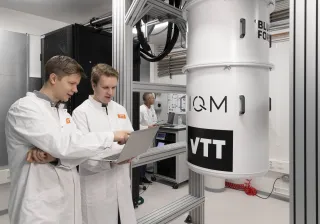The research project recently received €2.5 million from the EU to develop a more accurate type of a qubit.
Professor Mikko Möttönen of Aalto University and VTT has received a €2.5 million ERC Advanced Grant from the European Research Council for the ConceptQ project. This is the fifth time Möttönen has received one of the extremely competitive ERC grants.
Möttönen’ s team aims to develop a new qubit which will more accurately carry out quantum operations, such as those used in quantum computing. The team will also develop electronics that can operate at temperatures near absolute zero – in the millikelvin range.
‘Our new qubit does not require changes in the manufacturing process. In other words, this project is developing a new processor but using familiar materials,’ says Möttönen. ‘The structure of the new qubit is also very simple, which usually increases the yield in fabrication. There are no islands in the structure where electrons could be trapped, and the qubit is insensitive to disturbances in the electric field, for example’, he explains.
The main advantage of the new qubit is that it has more irregular back-and-forth movement of electric current, or non-linearity, than the common transmon qubit.
‘It’s precisely because of the stronger non-linearity that the new qubit can work faster without leaking to the wrong states, out of the zero-one computational space into a two or three’, Möttönen says and continues:
‘Unlike a classical bit, which can only have the value of zero or one, a quantum bit, or qubit, can have both values at the same time – that’s the property behind the great potential of quantum computers. But in theory, a qubit has an infinite number of states, and the states two and three can also be in a superposition.’ Möttönen explains that these additional states are typically not used in calculations and hence lead to errors.
‘The new qubit is more accurate because there is not as much time for errors to appear as usual. The current transmon qubit slips fairly easily into the wrong levels if you try to operate it too quickly. When that happens, the calculation goes awry and the end result is probably wrong,’ he explains.
Aiming for superior computing
The project will also develop low-temperature electronics, which can be utilised in quantum computers and other technologies.
‘In the future, quantum processors will be increasingly large and, thanks to the electronics we are developing, not every qubit would need its own control cable,’ says Möttönen.
Möttönen and his team are also developing a quantum algorithm that can boost the performance of quantum computers, which has not yet reached the level of classical supercomputers in useful computations. In the long run, the technologies developed by the project could have a wide range of applications, from quantum sensors and simulators to quantum thermodynamics, information security, and artificial intelligence.
Success through specialization
Over the years, Möttönen’ s research group has also studied quantum dots and electron pumps, but the team is no longer active in these areas. ‘If you want to be a world leader in a specific field, you can't do everything. You have to specialize in certain problems. We have achieved much better results in superconducting circuits than, say, quantum-dot research’, says Möttönen.
Three of the European Research Council's grants given to Möttönen were for five-year projects, and two were for smaller, roughly one-year projects aimed at commercialising quantum technologies.
‘All of our European Research Council projects have been around superconducting electrical circuits,’ says Möttönen. ‘In the first project we studied the bolometer, or radiation detector, and this led to a Nature article published in 2020 and new funding from the Future Makers. In another large project, we aim to control dissipation on demand with the help of a quantum-circuit refrigerator. This new project builds on our earlier work’, says Möttönen.
Möttönen's research group is part of the Academy of Finland's Centre of Excellence in Quantum Technology (QTF) and the National Quantum Institute (InstituteQ). The experiments use the national OtaNano research infrastructure.
The European Research Council (ERC) funds top researchers for high-quality and pioneering research. Researchers receiving ERC Advanced Grant funding have achieved very significant research results over the past ten years. Thus far, a total of 58 researchers in Finland have been granted ERC Advanced funding.
Möttönen has previously received the ERC Starting Grant for promising young researchers and the ERC Consolidator Grant for established top researchers. In addition to him, only two researchers have reached five-year ERC funding in Finland thrice: Aalto Professor Mika Sillanpää (Starting, Consolidator & Advanced) and University of Eastern Finland Professor Seppo Ylä-Herttuala (3 × Advanced).
Original press release published here.




